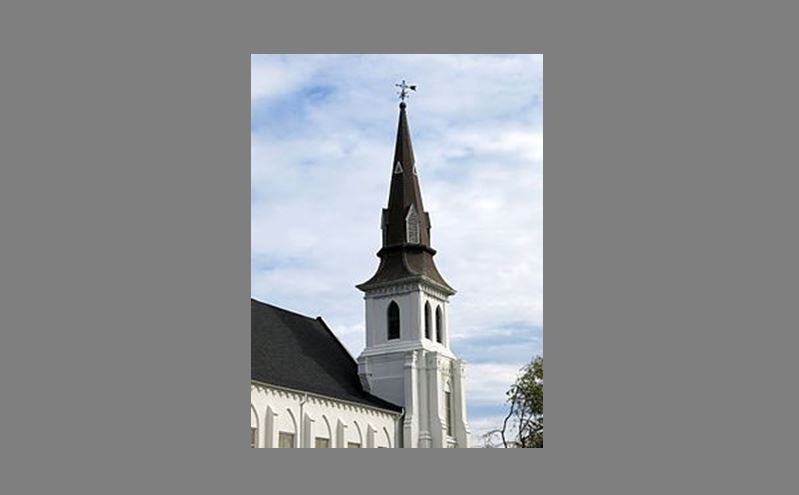The deaths in Charleston, S.C. have prompted grief, anger, fear, the question of whether there is any sanctuary, even in a sanctuary, from a violence and hate that continues. Some of today’s voices:
Earlier today, President Barack Obama issued a statement on the Charleston shootings:
…At some point, we as a country will have to reckon with the fact that this type of mass violence does not happen in other advanced countries. It doesn’t happen in other places with this kind of frequency. And it is in our power to do something about it. I say that recognizing the politics in this town foreclose a lot of those avenues right now. But it would be wrong for us not to acknowledge it. And at some point it’s going to be important for the American people to come to grips with it, and for us to be able to shift how we think about the issue of gun violence collectively.
The fact that this took place in a black church obviously also raises questions about a dark part of our history. This is not the first time that black churches have been attacked. And we know that hatred across races and faiths pose a particular threat to our democracy and our ideals.
The good news is I am confident that the outpouring of unity and strength and fellowship and love across Charleston today, from all races, from all faiths, from all places of worship indicates the degree to which those old vestiges of hatred can be overcome. That, certainly, was Dr. King’s hope just over 50 years ago, after four little girls were killed in a bombing in a black church in Birmingham, Alabama.
He said they lived meaningful lives, and they died nobly. “They say to each of us,” Dr. King said, “black and white alike, that we must substitute courage for caution. They say to us that we must be concerned not merely with [about] who murdered them, but about the system, the way of life, the philosophy which produced the murderers. Their death says to us that we must work passionately and unrelentingly for the realization of the American Dream.
“And if one will hold on, he will discover that God walks with him, and that God is able to lift you from the fatigue of despair to the buoyancy of hope, and transform dark and desolate valleys into sunlit paths of inner peace.”
Asheville, N.C. Baptist pastor Guy Sayles writes this at The Christian Century:
In many ways, American culture is harsh these days. We’re mesmerized by the false promises of happiness which money and power make. We’re afraid of unpredictable terrorism and of uncertain economic conditions. We’re prone to scapegoat those people who are different from us—to blame ‘the other” for our insecurities. Far too often, we’re willing, as in Jesus’ Parable of the Good Samaritan, to “pass by on the other side” and to leave people battered by violence, whether physical or emotional or economic, bleeding in the ditch.
I don’t know precisely what can be done, but I do know that we need for people who believe in the rightness of the dream of a beloved, just, and merciful community to speak and act in ways which counter the harshness all around us.
Rabbi Rachel Barenblat, in the Velveteen Rabbi:
A a white woman witnessing this horror from afar, I feel called to teshuvah, to soul-searching. What can I do to change the reality in which this kind of hate crime is possible? I want my nation to be better than this. I want humanity to be better than this.
May the Source of Comfort bring peace to all who mourn, and comfort to all who are bereaved.
In a blog post for the Diocese of Virginia, “Oh, my heart breaks: Prayers for Emanuel AME Church,” the Reverend Dr. Dorothy White, chaplain of St. Catherine’s School in Richmond Virginia, an ordained Episcopal priest and formerly a Baptist minister, writes:
As our bishops and deputies gather to share in the 78th General Convention, I would urge that you take time and focus on “those things that break the heart of God.” Loving as God loves is not without challenge. Loving as God loves will stretch our lives to such a degree that only a Holy God can make possible.
As a young girl, in times of hardship, when revenge and anger seemed like the best answer, my parents would lead us to pray. And they would keep saying, “Let us pray.” There were times that they even had to remind each other that the avenue of lasting change is always paved with prayer.
As we cry with Emmanuel African Methodist Episcopal Church, may we find in our prayers the voice and the actions that we so desperately need. May we not only love through social media outlets, but in thought, word and deed. Oh, “that our hearts would break with the things that break the heart of God.”
So as we pray, what shall we do? We raise the bar on what we will and will not stand. Silent, passive indifference – “because it’s not happening in my neighborhood” – is not what is needed from God’s people. Our baptismal vows call us together as the Body of Christ to renounce destructive actions and agendas no matter their origin.
We are far from powerless. I urge us to embrace the God that we are to present to those around us.
Posted by Cara Ellen Modisett

